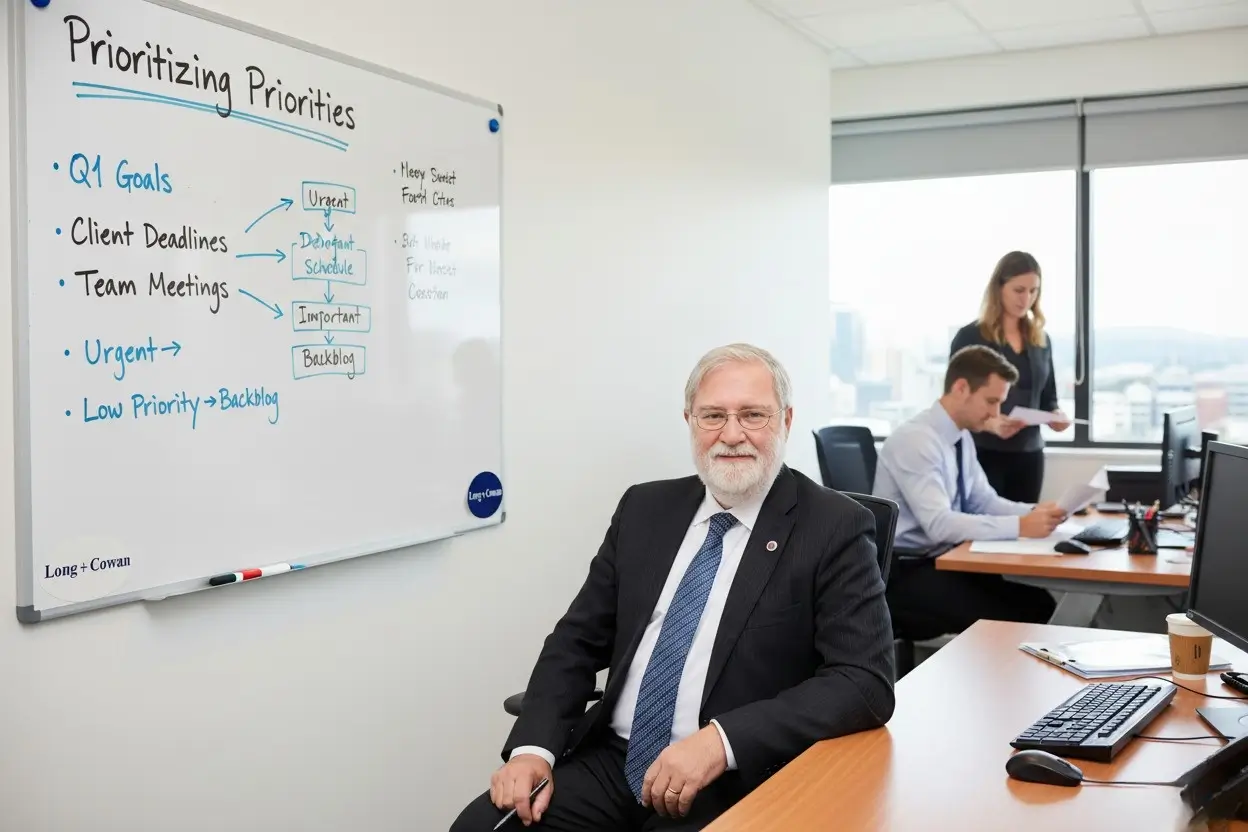In every industry, planning separates successful businesses from those that struggle. Clear strategic business planning provides structure, aligns teams, and allows leaders to make confident decisions. Without it, even good intentions turn into scattered effort and missed opportunities.
At Long + Cowan, we see Wellington businesses succeed when they plan deliberately rather than reactively. A plan does not restrict creativity; it channels it. It gives businesses a roadmap that links ambition with practical, actionable steps.
Understanding What Strategic Planning Involves
Strategic planning defines where you want to go and how to get there. It connects vision with operational reality. A good plan sets goals, allocates resources, and measures progress against clear milestones.
Planning is not just for large corporations. Small and medium-sized enterprises benefit even more, as it helps them prioritise and manage limited time and resources efficiently. In a competitive market, structure gives smaller businesses the edge.
Clarifying Goals and Priorities
Planning begins with clarity. Define what success looks like for your business. Set specific, measurable, achievable, and time-bound goals. For example, increasing revenue, improving client retention, or expanding service areas.
Once goals are defined, prioritise them. Attempting to achieve too many objectives at once spreads focus too thin. Start with the most impactful initiatives, then build from there. Clear priorities keep everyone aligned and motivated.
Linking Planning to Financial Management
A plan is only as strong as the numbers behind it. Integrating financial forecasting into strategic business planning ensures goals are realistic and supported by data.
Develop budgets, cash flow forecasts, and profit projections that align with your operational strategy. Review financial performance regularly to identify trends early. At Long + Cowan, we help Wellington businesses combine strategic intent with financial precision to support smarter, evidence-based decisions.
Allocating Resources Wisely
Planning helps businesses allocate their resources effectively. Resources include people, capital, time, and technology. Without planning, resources are often wasted on low-priority or duplicate work.
Assign responsibilities clearly and track progress. When everyone knows what they are responsible for, productivity improves, and accountability strengthens. Well-planned resource allocation prevents costly inefficiencies.
Identifying Risks and Opportunities
A strong plan prepares for both opportunities and threats. Risk management is not about avoiding risk entirely; it is about understanding and minimising it. Identify internal and external risks that could affect operations, from supply chain issues to regulatory changes.
At the same time, look for new opportunities in emerging markets or technology. Businesses that plan strategically anticipate change and adapt quickly, turning potential problems into competitive advantages.
Improving Productivity Through Structure
Structure improves productivity by giving each task a clear purpose. A plan eliminates guesswork and reduces wasted time on non-essential activities. When employees understand priorities, they can manage workloads more efficiently.
Regular reviews ensure that processes remain streamlined. When performance data highlights delays or inefficiencies, adjust the plan accordingly. Planning is dynamic, not static—it evolves as your business grows.
Encouraging Accountability Across Teams
A well-communicated plan ensures everyone understands their role in achieving company objectives. Assign measurable targets to departments and individuals. Accountability increases engagement, as staff can see how their work contributes to overall success.
Use regular team meetings or progress reports to maintain visibility. Transparent communication builds trust and ensures the entire organisation moves in the same direction.
Using Technology to Support Strategic Planning
Modern tools simplify planning and performance tracking. Cloud-based accounting systems, project management platforms, and data dashboards make it easier to analyse progress and make timely adjustments.
Technology gives managers real-time insight into performance indicators such as revenue growth, cost control, and productivity. At Long + Cowan, we help Wellington businesses implement digital solutions that link strategy with operational control.
Reviewing and Refining the Plan
A good plan evolves with experience. Schedule periodic reviews—quarterly or biannually—to measure results and adapt to changes in the market. Review financial reports, client feedback, and staff performance to ensure alignment with goals.
When challenges arise, use the plan as a guide rather than a rigid rulebook. Continuous refinement maintains momentum and ensures relevance in a changing environment.
Balancing Short-Term and Long-Term Focus
Strategic planning balances immediate needs with future goals. Short-term actions sustain daily operations; long-term objectives secure growth and stability. Too much focus on one neglects the other.
Establish separate timelines for tactical actions and strategic goals. This balance allows businesses to achieve progress today while building capacity for tomorrow. Planning connects current effort with future reward.
Fostering Collaboration and Communication
Planning succeeds when it involves the right people. Encourage managers, staff, and advisers to contribute ideas. Collaboration increases creativity and ensures the plan reflects practical realities rather than top-down assumptions.
Open discussion about goals and challenges promotes alignment and ownership. Employees are more likely to follow plans they helped shape. Shared understanding strengthens execution and accountability.
Adapting to Change with Confidence
Unplanned change causes disruption; planned change creates opportunity. Businesses that plan strategically can adjust to new conditions without panic. Whether facing economic shifts or technological updates, a well-prepared business remains steady.
Regular scenario analysis—reviewing best and worst-case outcomes—keeps teams ready for change. Preparedness builds confidence and protects performance during uncertainty.
Applying Planning Principles Across Wellington Businesses
Across Wellington Central, Te Aro, and Karori, businesses that prioritise strategic business planning outperform those that rely on reaction. Structured planning improves decision-making, resource allocation, and financial resilience.
When plans are realistic, measurable, and reviewed regularly, results follow naturally. Wellington businesses that plan ahead thrive even in competitive or volatile markets.
Partnering for Smarter Business Planning
Long + Cowan helps Wellington businesses develop, implement, and maintain structured plans that connect financial goals with strategic direction. We work alongside owners and managers to create clear, achievable frameworks for growth.
For expert assistance in planning and performance improvement, contact us for more info by filling in an enquiry form or e-mailing or calling us during office hours. Strategic planning builds confidence, clarity, and sustainable success—start yours today.
















































